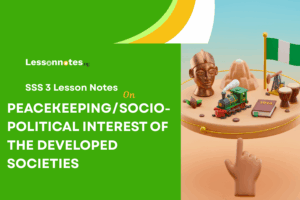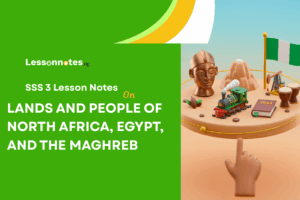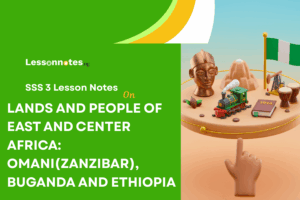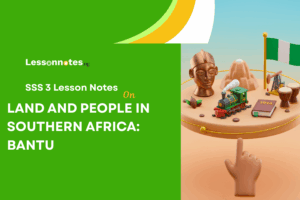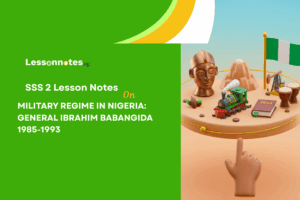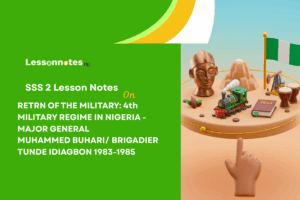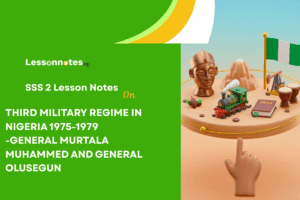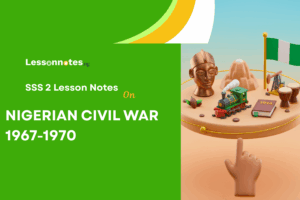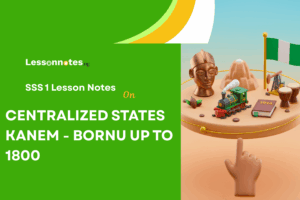The 4th Nigerian Civilian Republic: Olusegun Obasanjo (1999-2007) SS2 Nigerian History Lesson Note
Download Lesson NoteTopic: The 4th Nigerian Civilian Republic: Olusegun Obasanjo (1999-2007)
After many years of military rule, Nigeria returned to civilian democratic government on May 29, 1999. This day is now celebrated as Democracy Day in Nigeria. Chief Olusegun Obasanjo, a former military ruler (1976-1979) who had become a civilian, was elected as President. He was the candidate of the People’s Democratic Party (PDP).
Obasanjo’s election was significant because:
- He was a former military leader who had voluntarily handed over power to civilians in 1979
- He had been imprisoned by General Sani Abacha for allegedly planning a coup
- He was from the Yoruba ethnic group in the southwest, but had strong support from northern Nigeria
- He promised to fight corruption and improve Nigeria’s international image
The 1999 Constitution
The Fourth Republic operates under the 1999 Constitution, which has these key features:
- A presidential system of government
- Federal structure with powers shared between national, state, and local governments
- Separation of powers between executive, legislative, and judicial branches
- Fundamental human rights protections
- 36 states plus the Federal Capital Territory (Abuja)
First Term (1999-2003)
Consolidating Democracy
Obasanjo’s first major task was to ensure that democracy took root after years of military rule:
- He retired military officers who had held political positions
- He established civilian control over the armed forces
- He created space for a free press and civil society organizations
- He set up the Human Rights Violations Investigation Commission (Oputa Panel) to investigate past human rights abuses
- He allowed the National Assembly to function independently, sometimes leading to conflicts between the executive and legislative branches
Economic Reforms
Nigeria’s economy was in poor shape when Obasanjo took over:
- He created the Economic and Financial Crimes Commission (EFCC) to fight corruption
- He established the Independent Corrupt Practices Commission (ICPC)
- He began privatizing government-owned companies
- He worked to reduce Nigeria’s foreign debt
- He introduced the GSM mobile phone system, revolutionizing telecommunications in Nigeria
- He increased civil servant salaries to reduce corruption
Ethnic and Religious Tensions
Nigeria faced serious challenges from ethnic and religious conflicts:
- Sharia (Islamic law) was introduced in several northern states, causing tension
- Religious riots occurred in Kaduna and other cities
- Ethnic conflicts erupted in various parts of the country
- The Odi massacre occurred when soldiers killed civilians in a Niger Delta community in 1999
- The Zaki Biam massacre happened when soldiers killed civilians in Benue State in 2001
Obasanjo created the Niger Delta Development Commission (NDDC) to address the problems of the oil-producing regions.
Foreign Policy
Obasanjo worked to improve Nigeria’s international standing:
- He traveled to many countries to rebuild Nigeria’s image
- He helped form the New Partnership for Africa’s Development (NEPAD)
- He supported the transformation of the Organization of African Unity (OAU) into the African Union (AU)
- He resolved border disputes with neighboring countries
- He helped end civil wars in Sierra Leone and Liberia
- Nigeria rejoined the Commonwealth of Nations
Second Term (2003-2007)
2003 Elections
Obasanjo was re-elected in 2003, defeating his main challenger, General Muhammadu Buhari of the All Nigeria People’s Party (ANPP). However, these elections were criticized for irregularities and fraud in some areas.
Economic Reforms
Obasanjo’s second term saw more aggressive economic reforms:
- The banking sector was reformed, requiring banks to increase their capital base, which reduced the number of banks from 89 to 25 stronger banks
- Nigeria secured debt relief from the Paris Club in 2005, reducing the country’s foreign debt from $30 billion to $12 billion
- Oil production increased, bringing more revenue
- The National Economic Empowerment and Development Strategy (NEEDS) was launched
- The pension system was reformed with a contributory scheme
- The Excess Crude Account was created to save extra oil revenue
Anti-Corruption Campaign
The fight against corruption intensified:
- Several high-profile officials were investigated, including governors and ministers
- The EFCC, led by Nuhu Ribadu, recovered billions of naira in stolen funds
- Nigeria improved its ranking on international corruption indexes
- Public officials were required to declare their assets
However, critics said the anti-corruption fight was sometimes used against political opponents.
Power Sector Reforms
Nigeria had serious electricity problems, with frequent blackouts:
- Obasanjo unbundled the National Electric Power Authority (NEPA) into separate companies
- He invested billions of dollars to improve power generation
- Despite these efforts, power supply remained unreliable
Infrastructure Development
Obasanjo’s government invested in infrastructure:
- The Abuja-Kaduna highway was improved
- Work began on the Lagos-Kano railway modernization
- New airports were built or upgraded
- The Abuja city center was developed
The Third Term Agenda
Towards the end of his second term, there were attempts to change the constitution to allow Obasanjo to run for a third term:
- The National Assembly debated a constitutional amendment
- Civil society groups and many Nigerians opposed the idea
- In May 2006, the Senate rejected the amendment, ending the third term agenda
- Obasanjo accepted this decision and prepared to hand over power
2007 Elections and Transition
In 2007, elections were held to choose Obasanjo’s successor:
- Umaru Musa Yar’Adua of the PDP was elected president
- The elections were widely criticized as flawed by both Nigerian and international observers
- Despite the problems, Obasanjo handed over power on May 29, 2007
- This marked the first civilian-to-civilian transfer of power in Nigeria’s history
Major Achievements of the Obasanjo Administration
Political Achievements
- Consolidated democratic rule after years of military dictatorship
- Strengthened civilian institutions
- Completed two terms and handed over to another elected president
- Expanded political space for opposition and civil society
- Created new states and local governments
Economic Achievements
- Reduced external debt through Paris Club debt relief
- Grew the economy at an average of 6% annually
- Reformed the banking sector
- Liberalized the telecommunications sector
- Increased foreign investment
- Created the Economic and Financial Crimes Commission (EFCC)
- Privatized many government enterprises
- Increased foreign reserves from $3.7 billion in 1999 to $43 billion in 2007
Social Achievements
- Introduced the Universal Basic Education program
- Created the National Health Insurance Scheme
- Expanded university education with more federal universities
- Increased minimum wage for workers
- Addressed HIV/AIDS through prevention and treatment programs
- Created the Niger Delta Development Commission
Foreign Policy Achievements
- Restored Nigeria’s international reputation
- Played key roles in forming the African Union and NEPAD
- Led peacekeeping missions in West Africa
- Mediated in conflicts across Africa
- Improved relations with Western countries
Challenges and Criticisms
Political Challenges
- Political violence remained common
- Elections were flawed and often manipulated
- The third term agenda damaged Obasanjo’s democratic credentials
- Opposition parties were weak and fragmented
- The legislature and executive often clashed
Economic Challenges
- Poverty remained widespread despite economic growth
- Unemployment stayed high, especially among young people
- Infrastructure remained poor, especially electricity
- The economy remained dependent on oil
- Inequality between rich and poor increased
- Privatization sometimes benefited political allies
Security Challenges
- Religious and ethnic conflicts continued
- The Niger Delta militancy grew, with oil facilities attacked
- Police brutality remained common
- The Boko Haram sect began during this period, though it wasn’t yet a major threat
- Civilian massacres by the military in Odi and Zaki Biam
Corruption
- Despite anti-corruption efforts, corruption remained widespread
- Some saw the anti-corruption fight as selective, targeting opponents
- Some corrupt officials were never prosecuted
Legacy
Obasanjo’s eight-year presidency had a lasting impact on Nigeria:
- Democratic Stability: He established civilian rule that has continued (though with problems) to the present day.
- Economic Foundation: His reforms, especially in banking, telecommunications, and debt management, set the stage for later economic growth.
- International Standing: He restored Nigeria’s position as an important African leader.
- Anti-Corruption Institutions: He created institutions like EFCC that continue to fight corruption.
- Political Precedent: By accepting the rejection of the third term agenda and handing over power, he set an important democratic precedent.
The Fourth Republic that began with Obasanjo has now become Nigeria’s longest continuous democratic period since independence. While it has faced many challenges and is far from perfect, it represents an important break from the cycle of military coups that characterized earlier periods of Nigerian history.
Obasanjo himself remains a controversial figure in Nigerian politics. Some see him as the father of modern Nigerian democracy who made difficult but necessary reforms. Others criticize him for his sometimes authoritarian style, the flawed elections under his watch, and the unfulfilled promises of his administration. Regardless of these differing views, his presidency was a crucial period in Nigeria’s development as a democratic nation.



